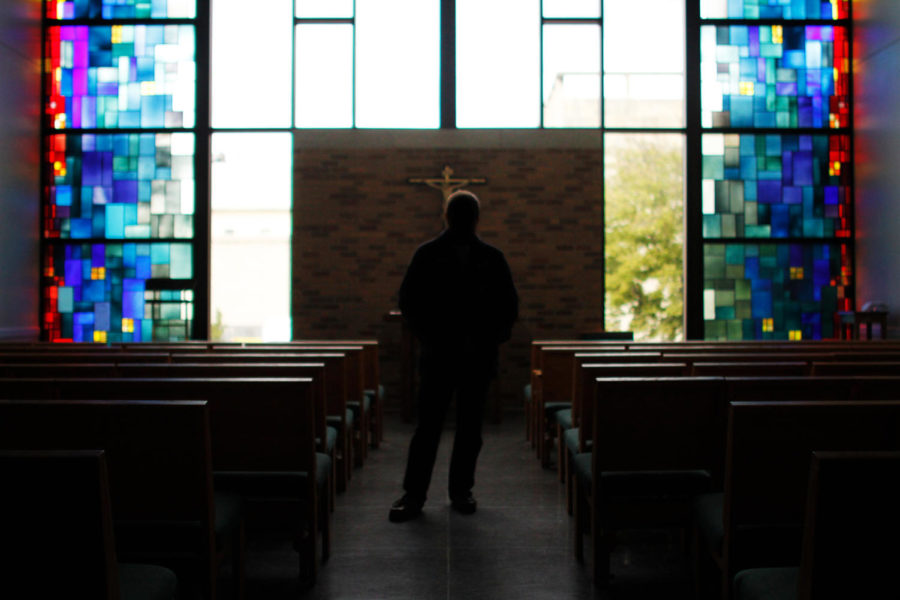Closet Atheists: New closed group provides support, discussion for students struggling with faith
Some students struggle with telling others their beliefs, especially when the question of one’s faith is brought up. Some students will not admit their beliefs for fear of judgment.
October 7, 2014
The transition from claiming religion to claiming faithlessness can be a difficult road.
To one Iowa State graduate student, college has been a time of discovery. During his time on campus, he has noticed that many students, including himself, who have come from religious backgrounds start to question their religion and some even disown it. He said the realization of not believing in the faith students were raised in be scary for many. The thought of being rejected by family and friends can put a strain on the already busy college life.
The graduate student knows this transition can be hard and has taken it upon himself to make it a little bit easier. His goal is to start a support group for the faithless and questioning students who haven’t told their families and friends about their faithlessness. He wants to create a group for closeted atheists.
The graduate student has asked to keep his name anonymous for the protection of himself and other potential members of the group.
“It can be hard because you don’t want to hurt family and you don’t want to hurt friends,” the student said. “You don’t want your relationships to change based on your [lack of belief]. Religion is something people can base their entire lives on.”
The student said he comes from a strong Christian family and discovered he did not believe the same as his family did during his time in college.
“The evidence that [supports Christianity] is just not there. It is missing to me,” the student said. “If I’m going to believe something then I need to see sufficient evidence to support it.”
Christjahn Beck, senior in political science and the new president of the Atheist and Agnostic Society, said he supports the student and the goal.
“He started to put the closet group together last year, and it really didn’t take off,” Beck said. “But it started gaining some momentum. Now that the AAS has so many more members there is a lot more interest in this group. I think it is really going to get going.”
Beck said he has always been intrigued by the student’s idea, but, since he is open about being atheist himself, he did not feel like it was his place to attend the meetings.
“I didn’t want to intrude and feel like I was stepping on toes that didn’t need to be stepped on,” Beck said. “But now that there is a real interest around it, it’s really cool to see it evolve.”
John Colyer, the head pastor at Ankeny Evangelical Free Church, said that many times the reason students lose their faith when coming to college is due to never having a faith of their own in the first place.
“I think that a lot of teens who grow up in [religious] homes just take on the faith of their parents for awhile,” Colyer said. “They may know a lot about the Bible, but the problem is that the faith never became their own.”
The student is planning for the atheist and agnostic closet group to meet monthly in an off-campus location. He wants the students to feel comfortable sharing their own stories and struggles with their family faith. He also wants to provide a support group to those who do decide to tell their loved ones.
“Both my parents were ministers. My grandfather was a minister, and my grandma played the organ for church,” Beck said. “I still don’t talk about it with my grandparents because they would see it as a failure of my mother’s parenting abilities.”
Beck does not try to hide his atheist views, and he said he is open to sharing his views with his grandparents if they ask him personally.
Dana Korneisel, senior in geology and the AAS treasurer, shared her thoughts about revealing one’s lack of faith to friends and family.
“I would say to accept what you do or don’t believe and always search for a better answer,” Korneisel said. “I mean, if there was a better answer, I would want to know it. And [to] come out in a controlled environment because you get a little more control over the situation.”
Korneisel said having control of the environment when coming out to family and friends will make them more focused on the point of the conversation and less likely to see the situation as a joke. A controlled environment can also help the student lead the discussion in a calm way, she said.
Alexandra Mielke, junior in psychology and vice president of the AAS, said she wants Iowa State students to know they are not alone in their struggles with belief.
“It is okay to be wrong. If you try your best and find out you are wrong, it’s okay,” Mielke said. “People make mistakes all the time. It’s okay.”
The student leading the closet group said students should find a support group where they can share their struggles and be comfortable being themselves.
Students with questions about the Atheist and Agnostic Society, the closeted atheist group or any other religious group can go to the student clubs and organizations page on the Iowa State website.







